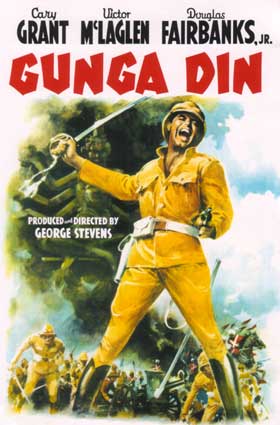Gunga Din
Director: George Stevens
Poet: Rudyard Kipling
Writers: Ben Hecht, Charles MacArthur, Joel Sayre, Fred Guiol
Cast:
- Cary Grant — Sgt. Cutter
- Victor McLaglen — Sgt. MacChesney
- Douglas Fairbanks Jr. — Sgt. Ballantine
- Sam Jaffe — Gunga Din
- Eduardo Ciannelli — the Guru
- Joan Fontaine — Emaline Stebbins
- Montagu Love — Col. Weed
- Reginald Sheffield — Rudyard Kipling
RKO: 1939
black & white; 117 minutes
Dry battlefields
Gunga Din is a fine adventure movie in the grand old Hollywood tradition. George Stevens' 1939 film is inspired by Rudyard Kipling's famous 1890 poem, "Gunga Din", about a low-caste water-bearer attached to the British Army in India.
Filmed in the California desert near Lone Pine, Gunga Din evokes a rough and rocky landscape, a harsh dry area; and harsher and drier when you have to march and fight there. As an unreformed old soldier remembers in the poem:
You may talk o' gin and beer
When you're quartered safe out 'ere,
An' you're sent to penny fights an' Aldershot it,
But when it comes to slaughter
You will do your work on water,
An' you'll lick the bloomin' boots of 'im that's got it.Rudyard Kipling
"Gunga Din" (1890)
Rudyard Kipling's Verse,
Definitive Edition

The Thuggee cult of murderers was suppressed by the British in India earlier in the Nineteenth Century. (There's an accessible and entertaining account by Mark Twain in Following the Equator.)
In Gunga Din, an up-country desert village is infiltrated and attacked by a revival of the Thugs. The nearest regimental Army post (including the three sergeants played with broad humor and bravery by Grant, McLaglen, and Fairbanks) receives its first warning when the telegraph line is cut. Suspense and adventure, interleaved with humor and a touch of romance, roar along.
Besides the three sergeants, there are fine characters present. Sam Jaffe is superb as Gunga Din, a regimental water-bearer. Eduardo Ciannelli is intelligent and menacing as the Thuggee leader. Joan Fontaine is the distracting fiancee of one of the sergeants. And, as our observing eye and recording pen, Reginald Sheffield as Rudyard Kipling.
Movies have been made based on old battle epics from the Iliad on forward, and plenty more based on warlike verse plays (Shakespeare and so on) and from operas, and a few from songs; but I don't believe there are many inspired by a modern poem, in this instance a poem of only five stanzas.
"Gunga Din" is an interesting companion to Kipling's "The Ballad of East and West. Both of these poems set in the rugged frontier of the British Raj are ultimately about respect, earned and acknowledged.
As the old soldier remembers:
Now in Injia's sunny clime,
Where I used to spend my time
A-servin' of 'Er Majesty the Queen,
Of all them blackfaced crew
The finest man I knew
Was our regimental bhisti, Gunga Din.
Gunga Din, in addition to all its humor and high adventure, is a worthy conveyance of Kipling's respect.
© 2005 Robert Wilfred Franson
Poetry at Troynovant
poetry, poets, & poetic inspiration
Warfare at Troynovant
war, general weaponry,
& philosophy of war
| Troynovant, or Renewing Troy: | New | Contents | |||
| recurrent inspiration | Recent Updates | |||
|
www.Troynovant.com |
||||
|
Feature Films: Queen Mab's ride |
||||
| Personae> | Strata | Topography |
|
|||